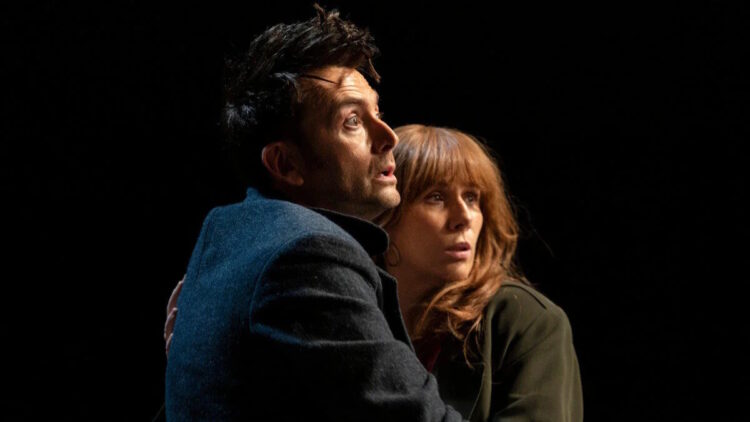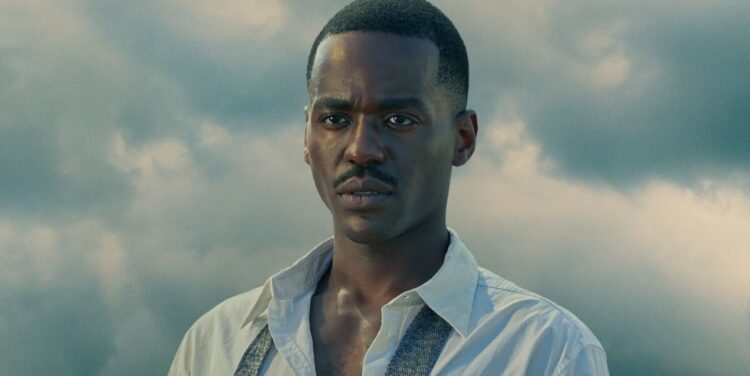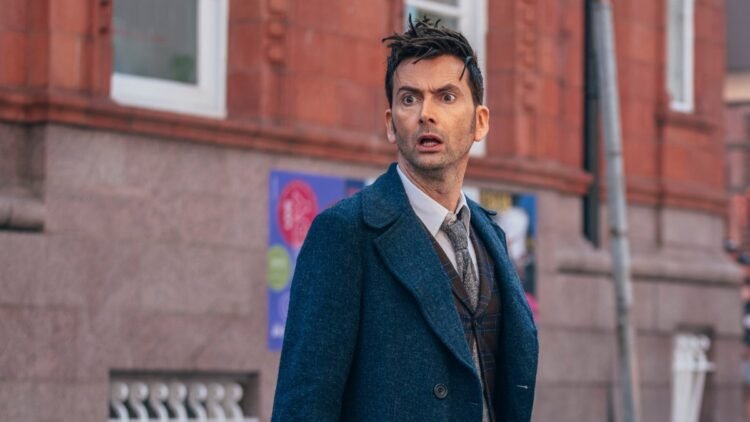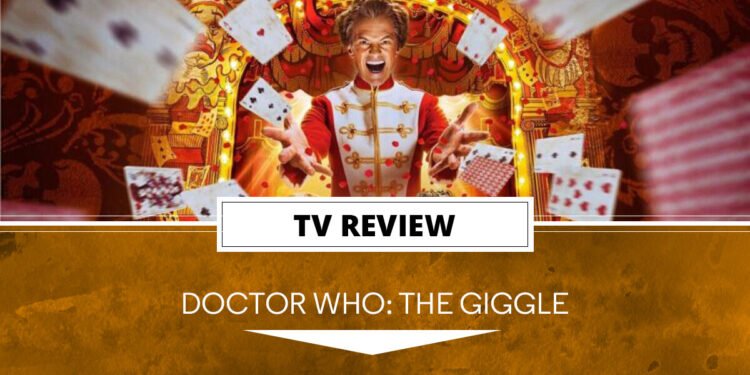And so, David Tennant’s run on Doctor Who comes to a close…again…kind of…it’s complicated. I will dedicate a good chunk of this final Doctor Who 60th Anniversary Special Review to that big twist ending and what it means. But we can’t ignore the lead-up to that because it was a very dramatic episode and easily the best of the set. So, shall we play a game?

After the events of “Wild Blue Yonder,” The Doctor and Donna wound up on an Earth that was tearing itself apart. But why? What was going on? As we would find out, not only was The Toymaker (a villain from the very first incarnation of Doctor Who) back, but he had input a “giggle” within every screen in the world. Anyone and everyone who had looked at it (that weren’t former companions to The Doctor) was forced into thinking that “they were right, and madness was born from it. After all, when everyone is right, no one is, and how can anyone stand that?

The Toymaker, as noted, is a very old villain, but not only did the special showcase him in his original form via colorized flashbacks, but Neil Patrick Harris brought an awe, wonder, and maliciousness to the character that was hard to ignore and deny. You might think that his doing a “Spice Girls” routine in UNIT would be “a bit much,” but it’s the exact opposite. First off, Harris is a musical man, and he proved that many times over, including being The Music Meister in Batman: The Brave and The Bold and making various appearances on Broadway. He LOVES doing stuff like this. However, for The Toymaker, it’s a game. One led to some of UNIT’s undoing as they didn’t understand the rules of said game.
That was something I deeply appreciated about this special is that they made sure The Toymakers’ powers and motivations were clearly understood throughout the episode. He loves the game and loves to win, and while he’ll play fair, that doesn’t mean he won’t go all out to win. His speech about why he loved Earth and all the “games” that humanity has made definitely felt true to character. Even the concept of “mind games” was prevalent because, in the opening scene, we hear The Toymaker do a rather racist line, which, at first, seems a bit “too much.” But he did it because he knew it would rattle the customer, meaning he won that “mind game.”
Harris’s use of accents throughout the episode was also clever. He used them to trick people, and then when doing his puppet show for The Doctor and Donna, he dropped it every time The Doctor pointed out how his companions technically didn’t die because of him, only for The Toymaker to plainly say, “Well that’s alright then!” in the most mocking tone ever. The only problem I had with the character was that he was banished forever when I feel they could’ve done more with him in the future. But hey, there’s always a way to play a new game!

But make no mistake! For the most part, this episode still belonged to David Tennant and Catherine Tate. The friendship between Donna and The Doctor is supreme and something to be cherished. From Donna asking him to talk about his past to helping console him when he’s worried about The Toymaker, and so on, this is why she is remembered as one of the best Doctor Who companions. And Tennant rocked it as The Doctor. From showing remorse over the ones that died because of The Toymaker to actually trying to make his foe the next compassion to save everyone (which, I admit, would’ve been interesting!), and his admittance of having a “happy life” with his “new family” were spot-on.
I also liked some of the “little touches” that made the episode feel grand. For example, we saw the return of Melanie in UNIT and even saw Kate offer Donna a job (which Donna negotiated epically. GO DONNA!!) Why did I like that? It tied into the Flux event where Kate was trying to bring in former companions to UNIT because of their experience, which makes total sense!
And while we only saw him briefly, we got a great glimpse at Ncuti Gatwa’s Fifteenth Doctor and what he’ll be like. I’ll admit. I’m already a fan. He has an energy that reminds me of Matt Smith but on a totally different spectrum. The way he talked, how he hugged his “former self” and cleverly figured out certain things, it was great! I’m very curious about what his adventures will be like, and we only have to wait until Christmas to see the first one! But, seriously, get the man some pants!!!

One more thing. There’s been LOTS of chatter in recent times about shows being “too political,” and I’m sure some people will watch “The Giggle” and see numerous references to our world and its current state by The Doctor and The Toymaker. But that’s the rub, isn’t it? It hurts because it’s true. I didn’t mind it; if anything, this is a glimpse of what we can become if we’re not careful. If we can’t learn lessons from what we watch, we’re doing something wrong.
Alas, we get to the part of my Doctor Who 60th Anniversary Special Review where I DO talk about what’s wrong—first, the smaller element. While I liked The Doctors (plural) using the “oldest game” to beat The Toymaker…it felt a bit too simple, especially when they all made extreme catches, and it was a more basic one that stopped The Toymaker. Yes, some endings can be simple, but this was far too simple for such an “elemental force.”
But the big problem I had…was the Bi-generation. Many people didn’t like the retcon of “The Timeless Child” in the last series with Jodie Whittaker, but for me, this is just as bad in the retcon sense. Why? Because it doesn’t make sense and feels like the ultimate copout.

Here’s why I think that. One of the points of Doctor Who in the overall is that every Doctor, regardless of form or gender, has to die and “move on” to the next life. That’s ingrained in the show, and it’s part of how life works in a basic way. But here, they not only allowed David Tennant’s version of The Doctor to live, but he has a Tardis all his own. Plus, according to showrunner Russell T. Davies, the past Doctors have ALSO Bi-generated, and are now getting their “happy endings” via things like Tales of the Tardis. Except that makes no sense!
Some of the Doctors already had “meaningful happy endings,” like Capaldi’s when he realized in “Twice Upon A Time” that Bill lived, Clara was still around, and he didn’t need to defeat another villain. Matt Smith even got a happy ending when he got to “see Amelia” one more time and said he’d always remember when The Doctor was him. Plus, if all of them have a Tardis, their adventures never have to end, and thus, they don’t need a “happy ending” in the first place. That’s something Tennant’s Doctor admitted when he said he took Rose to Mars and Melanie to The Gilded Age! So, if anything, he could’ve just spent the rest of “this life” with Donna’s family, watched them grow old, and then regenerated.
Are you seeing what I’m saying here? I don’t mind happy endings, but this felt forced and calls into question the Doctor Who timeline even more! Not to mention, do these “other Doctors” still have the ability to regenerate? I don’t know, and it makes it even more confusing.
Even with that, I want to circle back and note that this Doctor Who 60th Anniversary Special Review is ending positively! I did like the episode! I just feel that Davies and the crew went a little too far to try to “make everyone happy” when that kind of belittles the point of The Doctor and his adventures at times. Even still, I look forward to the 15th Doctor and their compansions’ adventures!
Doctor Who 60th Anniversary Special Review
Summary
The final Doctor Who 60th Anniversary Special brought in a new Doctor and parted ways with a famous one. While it might not be the ending everyone expected, or desired, it will definitely get everyone talking as we head to the 15th Doctor’s adventures!
-
Doctor Who 60th Anniversary Special Review


